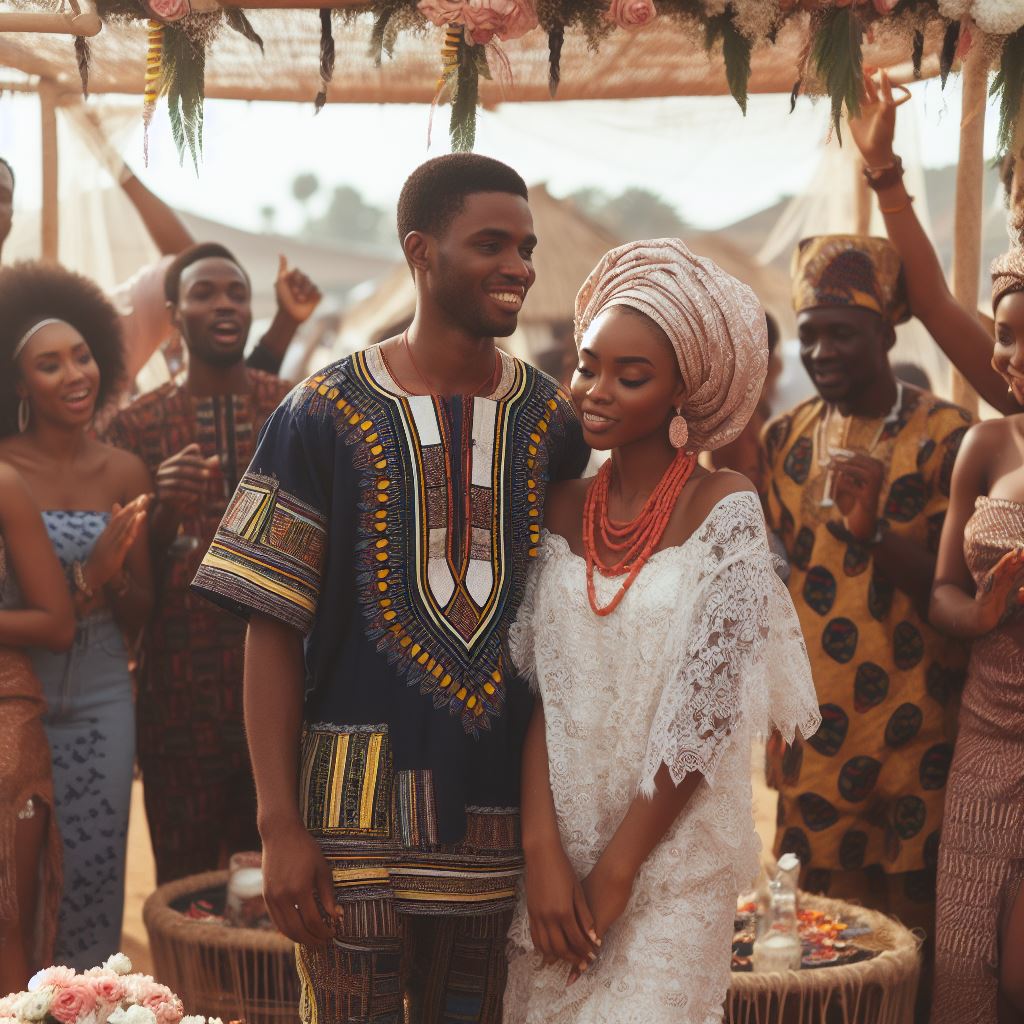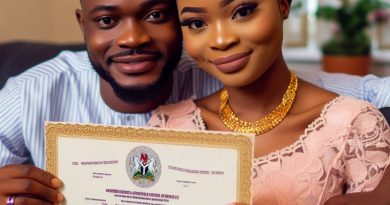Comparing Western and Nigerian Views on Marriage
Last Updated on January 28, 2024
Introduction
Brief overview of marriage in Nigeria and Western countries
Marriage deeply roots in the cultural and social fabric of both Nigeria and Western countries.
In Nigeria, it symbolizes a union between two families, celebrating love, commitment, and the joining of families.
In Western countries, it constitutes a legal contract between two individuals based on love and choice.
Purpose of the blog post – to compare and contrast Nigerian and Western views on marriage
The purpose of this blog post is to explore and discuss the similarities and differences between Nigerian and Western views on marriage.
By doing so, we hope to foster cross-cultural understanding and shed light on these important and often misunderstood aspects of different societies.
Thesis statement – Despite some similarities, there are significant differences between Nigerian and Western views on marriage.
Both Nigerian and Western societies value marriage, influenced by cultural, traditional, and societal factors shaping perceptions and practices.
It is important to examine these variations to appreciate the diversity and beauty of marital relationships around the world.
Traditional Views on Marriage
Influence of culture, customs, and tradition
- Nigerian marriage practices are heavily influenced by culture, customs, and tradition.
- These elements shape the expectations and behaviors of individuals within the institution of marriage.
- Marriages are seen as a way to preserve cultural heritage and pass it on to future generations.
- Traditional ceremonies and rituals play a significant role in the celebration of marriage in Nigeria.
Role of family and community in the marriage process
- Nigerian marriages are not just the union of two individuals but the coming together of two families.
- Extended family members and community elders have a say in the decision-making process.
- Consultation and approval from family and community members are essential before the marriage takes place.
- This involvement creates a strong support system and helps in conflict resolution within the marriage.
Importance of dowry and bride price
- Dowry and bride price hold significant importance in Nigerian marriages.
- Dowry, given by the groom’s family, symbolizes the groom’s ability to take care of the bride.
- Bride price, paid by the groom’s family to the bride’s family, demonstrates respect and gratitude.
- These financial transactions also serve as a form of wealth redistribution within the community.
Emphasis on extended family and communal living
- In Nigeria, marriage extends beyond the couple and includes the extended family.
- Living arrangements often involve communal living with other family members.
- Grandparents, uncles, aunts, and cousins play active roles in childcare and household responsibilities.
- Communal living fosters a sense of belonging and strengthens family bonds.
Culture, customs, and tradition deeply influence traditional Nigerian perspectives on marriage, emphasizing heritage preservation.
Elaborate ceremonies and rituals characterize marriages as well.
The role of family and community in the marriage process is crucial, with their consultation and approval being necessary.
Dowry and bride price hold immense importance, showcasing the groom’s ability to take care of the bride and serving as a means of wealth redistribution.
Lastly, the emphasis on extended family and communal living in Nigerian marriages promotes a strong support system and strengthens family bonds.
Read: Essential Tips for Strengthening Marriages in Nigeria
Changing Nigerian Views on Marriage
Impact of urbanization and globalization
- Rapid urbanization in Nigeria has brought about significant changes in traditional views on marriage.
- The influence of globalization has exposed Nigerians to different cultures and perspectives on marriage.
- Urbanization and globalization have led to an increase in intercultural marriages and a blending of diverse traditions.
Rise of love marriages and individual choice
- Traditional arranged marriages in Nigeria are gradually being replaced by love marriages.
- Nigerian youths are increasingly prioritizing personal choice and compatibility when selecting marital partners.
- The perception of marriage as a union based on love and mutual understanding is gaining traction in Nigerian society.
Influence of Western media and exposure to different values
- Western media, such as movies and television shows, has played a significant role in shaping Nigerian views on marriage.
- Exposure to Western ideals of romance, companionship, and equality has influenced Nigerians to expect similar values in their own marriages.
- Young Nigerians are embracing Western notions of independence and gender equality within the institution of marriage.
Shift towards nuclear family and less emphasis on extended family
- Traditionally, Nigerian marriages were not just between two individuals but also involved extended family members.
- However, modern Nigerian couples are increasingly opting for smaller, nuclear family units.
- The focus has shifted from the responsibilities associated with extended family to prioritizing individual goals, careers, and personal happiness.
In a nutshell, Nigerian views on marriage have undergone significant changes in recent times.
Factors such as urbanization, globalization, the rise of love marriages, exposure to Western media, and the shift towards nuclear families have all contributed to these changing views.
Nigeria’s evolving perspective on marriage reflects a blending of traditional values and the adoption of progressive ideas from the Western world.
Read: Echoes of Everlasting Love: Traditional Nigerian Prayers for Anniversaries
Western Views on Marriage
Focus on individualism and personal fulfillment
- Western societies emphasize the importance of personal happiness and self-fulfillment in marriage.
- Encourage individuals to prioritize their needs and desires in marital relationships, seeking partners fostering personal growth.
- The focus is on finding a partner who can support personal goals and contribute to individual growth.
- View marriage as enhancing one’s happiness and self-actualization.
- Value personal freedom and autonomy, enabling individuals to pursue their interests and dreams.
Role of romantic love and compatibility
- Western societies place a significant emphasis on romantic love as a foundation for a successful marriage.
- The belief is that love and emotional connection are essential for a fulfilling long-term partnership.
- Compatibility is highly regarded, including shared interests, values, and goals.
- The expectation is to build a deep emotional bond with the partner, leading to a satisfying and lasting relationship.
- Romantic love is seen as the driving force behind a successful and happy marriage.
Legal and contractual aspects of marriage
- Western societies view marriage as a legal and contractual union between two individuals.
- Marriage involves legal rights, responsibilities, and obligations.
- Spouses have legal protections, such as property rights, inheritance, and healthcare decision-making.
- The marriage contract defines the expectations, rights, and division of roles within the relationship.
- Dissolving a marriage requires a legal process, such as a divorce, with clear guidelines and procedures.
Changing societal perceptions of gender roles and equality
- Western societies have witnessed a shift in perceptions of gender roles within marriage.
- Challenges to traditional gender roles arise as men no longer exclusively bear the primary breadwinning role.
- Highly value equality between partners, emphasizing shared responsibilities and decision-making.
- Encourage women to pursue careers and goals, not solely defined by their roles as wives and mothers.
- The expectation is to create a partnership where both partners have equal rights, opportunities, and responsibilities.
Overall, Western views on marriage revolve around individualism, personal fulfillment, romantic love, compatibility, legal aspects, and changing perceptions of gender roles.
There is an emphasis on personal happiness and self-actualization within the marital relationship, along with the importance of emotional connection and shared values.
Western societies recognize marriage as a legal and contractual union, with clear rights and obligations.
Moreover, there is a growing recognition of gender equality, challenging traditional gender roles and fostering equal partnerships.
Read: Why Marriage Counseling is Gaining Popularity in Nigeria

Uncover the Details: Cherishing Marital Bonds: Why Nigerians Believe ‘Marriage is Honourable’
Similarities between Nigerian and Western Views on Marriage
Importance of commitment and companionship
- In both Nigerian and Western cultures, marriage is seen as a lifelong commitment.
- Both Nigerians and Westerners value the idea of a life partner and the companionship that comes with marriage.
- Marriage is seen as a union where both partners support and rely on each other.
- Commitment is considered essential for a successful marriage in both cultures.
- Both Nigerian and Western couples believe in standing by each other through thick and thin.
Desire for happiness and contentment in the marital relationship
- Both Nigerian and Western cultures emphasize the importance of finding happiness in a marriage.
- There is a shared desire for a loving and fulfilling relationship between spouses.
- Both cultures recognize the need for emotional support and security in a marriage.
- Both Nigerians and Westerners believe that marriage should bring joy and contentment to both partners.
- Happiness is considered a fundamental aspect of a successful marriage in both cultures.
Recognition of the importance of communication and mutual respect
- Both Nigerian and Western cultures understand the significance of effective communication in a marriage.
- Couples in both cultures strive to have open and honest conversations with each other.
- Respecting each other’s opinions and ideas is valued in both Nigerian and Western marriages.
- Listening and understanding each other’s needs is considered crucial for a healthy relationship.
- Both cultures recognize that good communication leads to better understanding and stronger bonds.
Desire for a stable and lasting union
- In both Nigerian and Western cultures, the institution of marriage is meant to be lasting.
- Couples in both cultures aspire to build a stable and long-lasting bond.
- Both Nigerians and Westerners believe in working through challenges to maintain a strong marriage.
- Divorce is generally seen as a last resort and avoided if possible in both cultures.
- Both cultures value the idea of growing old together and sharing a lifetime of memories.
In fact, while Nigerian and Western cultures may differ in various aspects of marriage, there are also notable similarities.
Both emphasize commitment, companionship, happiness, communication, respect, and a desire for a stable and lasting union.
Understanding and appreciating these similarities can lead to a broader appreciation of diverse perspectives on marriage.
Read: Navigating Marriage’s Waters: Prayers for Nigerian Couples’ Milestones
Differences between Nigerian and Western Views on Marriage
Traditional vs. modern approaches to matchmaking and partner selection
- Nigerians have a more traditional approach, with arranged marriages being common.
- Western societies prioritize individual choice and compatibility when it comes to partner selection.
- In Nigeria, elders, family, and friends often play a significant role in matchmaking.
- Westerners, on the other hand, rely on dating apps, social events, and personal preferences to find partners.
Influence of religion and religious practices in Nigerian marriages
- Religion holds a crucial place in Nigerian marriages, with the majority being either Christian or Muslim.
- Marriage ceremonies often involve religious observances, rituals, and blessings from clergy members.
- Faith-based teachings emphasize the importance of commitment, love, and fidelity in marital relationships.
- In Western cultures, the influence of religion on marriage has become less prominent over the years.
Perception of divorce and its acceptance in society
- Nigerian society generally views divorce as an unfavorable outcome and considers marriage as a lifelong commitment.
- In Western communities, divorce is more accepted as a valid option if the marriage is no longer working.
- Social stigma surrounding divorce is still prevalent in Nigeria, making it a less common choice.
- Western societies have witnessed a significant increase in divorce rates due to changing attitudes towards marital dissolution.
Role of gender, patriarchy, and women’s rights in marriage
- Nigerian marriages often adhere to traditional gender roles, where the husband is the breadwinner and the wife takes care of the household.
- Male dominance and patriarchy still influence marital dynamics in many Nigerian households.
- Western societies have made substantial progress towards gender equality, with women enjoying more rights and opportunities.
- In Western marriages, gender roles are more fluid, and responsibilities are shared between partners.
Overall, Nigerian and Western views on marriage differ in terms of matchmaking, religious influence, divorce acceptance, and gender dynamics.
While Nigeria leans towards traditional practices, Western societies embrace modern approaches and progressive ideas.
Understanding these differences can enhance cultural awareness and foster respect for diverse marital perspectives.
Find Out More: The Evolution of Marriage Vows in Modern Nigeria
Conclusion
Recap of the main points discussed
Throughout this section, we have explored the differences and similarities between Western and Nigerian views on marriage.
We have discussed how Western societies prioritize individualism and personal fulfillment in marriage, while Nigerian cultures emphasize family and communal values.
Additionally, we have examined the contrasting perspectives on gender roles and expectations within marital relationships.
Another key point highlighted was the varying importance placed on arranged marriages and the role of parental consent in the two cultures.
Lastly, we explored the impact of globalization on the evolution of marriage practices in both Western and Nigerian societies.
Reiteration of the thesis statement
In closing, this section aimed to showcase the divergent views on marriage between Western and Nigerian cultures.
It aimed to shed light on the distinct factors that shape these views, including cultural values, societal norms, and historical contexts.
Final thoughts on the significance of understanding and appreciating diverse views on marriage
Understanding and appreciating diverse views on marriage is crucial for fostering cultural empathy and promoting intercultural communication.
It allows for a deeper appreciation of the rich tapestry of human experiences and challenges ethnocentrism.
By recognizing and accepting diverse views on marriage, we can break down stereotypes and bridge cultural divides.
Moreover, it highlights the importance of cultural competence in fostering healthy and inclusive relationships in an increasingly interconnected world.


